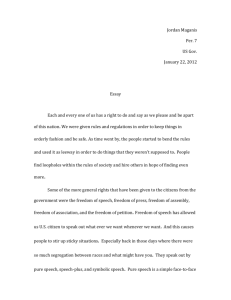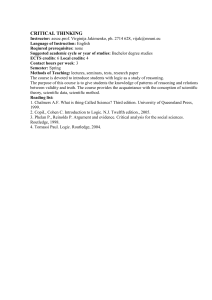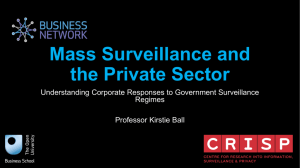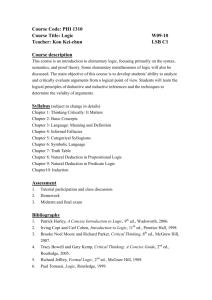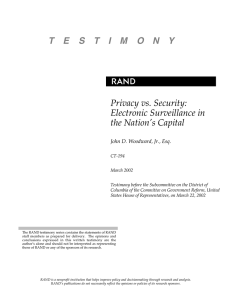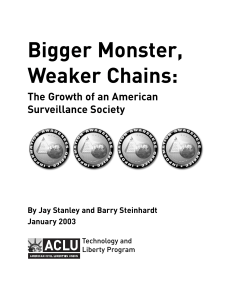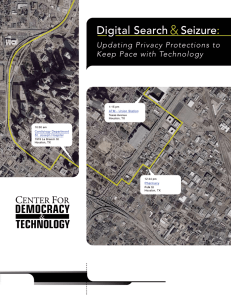Alexis Obernauer Preliminary Bibliography January 25, 2012 *Note
advertisement
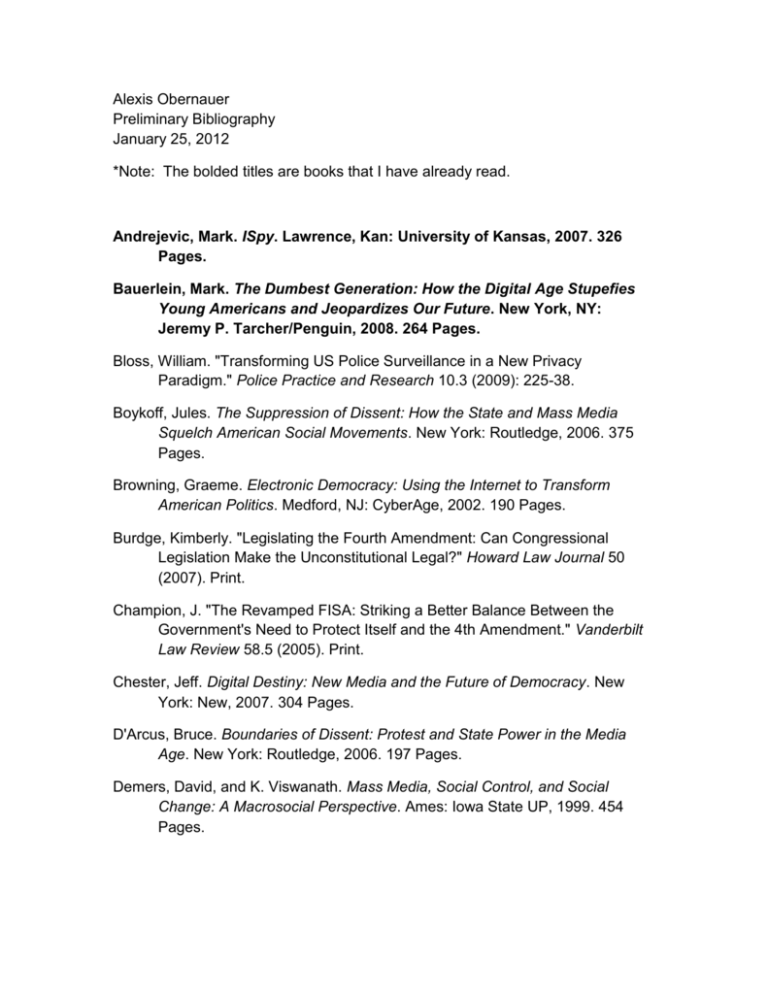
Alexis Obernauer Preliminary Bibliography January 25, 2012 *Note: The bolded titles are books that I have already read. Andrejevic, Mark. ISpy. Lawrence, Kan: University of Kansas, 2007. 326 Pages. Bauerlein, Mark. The Dumbest Generation: How the Digital Age Stupefies Young Americans and Jeopardizes Our Future. New York, NY: Jeremy P. Tarcher/Penguin, 2008. 264 Pages. Bloss, William. "Transforming US Police Surveillance in a New Privacy Paradigm." Police Practice and Research 10.3 (2009): 225-38. Boykoff, Jules. The Suppression of Dissent: How the State and Mass Media Squelch American Social Movements. New York: Routledge, 2006. 375 Pages. Browning, Graeme. Electronic Democracy: Using the Internet to Transform American Politics. Medford, NJ: CyberAge, 2002. 190 Pages. Burdge, Kimberly. "Legislating the Fourth Amendment: Can Congressional Legislation Make the Unconstitutional Legal?" Howard Law Journal 50 (2007). Print. Champion, J. "The Revamped FISA: Striking a Better Balance Between the Government's Need to Protect Itself and the 4th Amendment." Vanderbilt Law Review 58.5 (2005). Print. Chester, Jeff. Digital Destiny: New Media and the Future of Democracy. New York: New, 2007. 304 Pages. D'Arcus, Bruce. Boundaries of Dissent: Protest and State Power in the Media Age. New York: Routledge, 2006. 197 Pages. Demers, David, and K. Viswanath. Mass Media, Social Control, and Social Change: A Macrosocial Perspective. Ames: Iowa State UP, 1999. 454 Pages. Dinev, T., P. Hart, and M. Mullen. "Internet Privacy Concerns and Beliefs about Government Surveillance – An Empirical Investigation." The Journal of Strategic Information Systems 17.3 (2008): 214-33. Print. Divoll, Vicki. "The "Full Access Doctrine": Congress's Constitutional Entitlement to National Security Information from the Executive." Harvard Journal of Law and Public Policy 43.2 (2011). Print. Fuchs, Christian. Internet and Surveillance: The Challenges of Web 2.0 and Social Media. New York: Routledge, 2012. 332 Pages. Goldsmith, Jack L., and Tim Wu. Who Controls the Internet?: Illusions of a Borderless World. New York: Oxford UP, 2006. 226 Pages. Gournelos, Ted. Transgressions 2.0. New York: Continuum, 2012. 312 Pages. Habermas, Jürgen. The Structural Transformation of the Public Sphere: An Inquiry Into a Category of Bourgeois Society. Cambridge, MA: MIT, 1989. 301 Pages. Hardt, Michael, and Antonio Negri. Empire. Cambridge, MA: Harvard UP, 2000. 478 Pages. Hunter, Richard. World Without Secrets: Business, Crime, and Privacy in the Age of Ubiquitous Computing. New York: J. Wiley, 2002. 307 Pages. Kamarck, Elaine Ciulla., and Joseph S. Nye. Governance.Com: Democracy in the Information Age. Washington, D.C.: Brookings Institution, 2002. 204 Pages. Katyal, N., and R. Caplan. "The Surprisingly Stronger Case For The Legality Of The Nsa Surveillance Program: The Fdr Precedent. " Stanford Law Review 60.4 (2008): 1023-1077. ABI/INFORM Global, ProQuest. Web. 25 Jan. 2012. Kollar, Justin F. "USA Patriot Act, the Fourth Amendment, and Paranoia: Can They Read This While I'm Typing?" The Journal of High Technology Law, 3.1 (2004). Lasn, Kalle. Culture Jam: The Uncooling of America. New York: Eagle Brook, 1999. 320 Pages. Lessig, Lawrence, Code: Version 2.0. [S.l.]: SoHo, 2010. 410 Pages. McChesney, Robert Waterman. Rich Media, Poor Democracy: Communication Politics in Dubious Times. Urbana: University of Illinois, 1999. 448 Pages. Monaghan, Garrett, and Sean Tunney. Web Journalism: A New Form of Citizenship? Eastbourne: Sussex Academic, 2010. 347 Pages. Packard, Ashley. Digital Media Law. Chichester, West Sussex, U.K.: WileyBlackwell, 2010. 368 Pages. Schiller, Herbert I. Culture, Inc.: The Corporate Takeover of Public Expression. New York: Oxford UP, 1989. 158 Pages. Slobogin, Christopher. Privacy at Risk: The New Government Surveillance and the Fourth Amendment. Chicago: University of Chicago, 2007. 274 Pages. Solove, Daniel J. Nothing to Hide: The False Tradeoff Between Privacy and Security. New Haven [Conn.: Yale UP, 2011. 257 Pages. Tapscott, Don. Grown Up Digital: How the Net Generation Is Changing Your World. New York: McGraw-Hill, 2009. 384 Pages. Tapscott, Don, and Anthony D. Williams. Wikinomics: How Mass Collaboration Changes Everything. New York: Portfolio, 2006. 320 Pages. Van de donk, Wim. Cyberprotest: New Media, Citizens, and Social Movements. London: Routledge, 2004. 336 Pages. Witte, James C., and Susan E. Mannon. The Internet and Social Inequalities. New York: Routledge, 2010. 192 Pages. On my honor, I have not given, nor witnessed, nor received any unauthorized assistance on this work. Alexis Obernauer.

